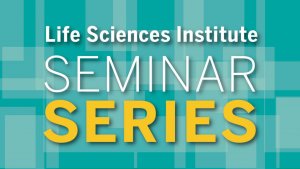Presented By: Life Sciences Institute (LSI)
LSI Seminar Series: Yves Chiswili Chabu, Ph.D., University of Missouri-Columbia
Cooperation between oncogenic Ras and p53 stimulates JAK/STAT non-cell autonomously to promote Ras tumor radioresistance

Abstract:
Oncogenic RAS mutations are associated with tumor resistance to radiation therapy. The underlying mechanisms remain unclear. Emergent cell-cell interactions in the tumor microenvironment (TME) profoundly influence therapy outcomes. The nature of these interactions and their role in Ras tumor radioresistance remain unclear. Using Drosophila and human Ras cancer cells we discovered that oncogenic Ras co-opts genotoxic stress-induced p53 function to drive tumor recurrence via paracrine JAK/STAT signaling in the TME.
p53 is heterogeneously activated in Ras tumor tissues in response to irradiation. This mosaicism allows high p53-expressing Ras clones to stimulate JAK/STAT cytokines, which activate JAK/STAT in the nearby low p53-expressing resistant Ras clones, leading to robust tumor re-establishment. Blocking any part of this cell-cell communication loop re-sensitizes Ras tumor cells to irradiation. This finding suggests that coupling STAT inhibitors to radiotherapy might improve clinical outcomes for Ras cancer patients.
Speaker:
Yves Chiswili Chabu, Ph.D.
Assistant Professor, Division of Biological Sciences
University of Missouri-Columbia
Yves Chiswili Chabu received his Ph.D. at the University of Oregon. He did his postdoctoral work and Fellowship at Yale University where he used Drosophila and human tissue culture models to understand how intercellular RAS signaling evolves in the tumor microenvironement. Chabu is an assistant professor at the University of Missouri-Columbia and the scientific director of the Cancer Research Center in Columbia Missouri. His research interests at the University of Missouri includes delineating therapy resistance mechanisms in EGFR/RAS-driven tumors and understanding how these signals emerge and support disease progression.
Oncogenic RAS mutations are associated with tumor resistance to radiation therapy. The underlying mechanisms remain unclear. Emergent cell-cell interactions in the tumor microenvironment (TME) profoundly influence therapy outcomes. The nature of these interactions and their role in Ras tumor radioresistance remain unclear. Using Drosophila and human Ras cancer cells we discovered that oncogenic Ras co-opts genotoxic stress-induced p53 function to drive tumor recurrence via paracrine JAK/STAT signaling in the TME.
p53 is heterogeneously activated in Ras tumor tissues in response to irradiation. This mosaicism allows high p53-expressing Ras clones to stimulate JAK/STAT cytokines, which activate JAK/STAT in the nearby low p53-expressing resistant Ras clones, leading to robust tumor re-establishment. Blocking any part of this cell-cell communication loop re-sensitizes Ras tumor cells to irradiation. This finding suggests that coupling STAT inhibitors to radiotherapy might improve clinical outcomes for Ras cancer patients.
Speaker:
Yves Chiswili Chabu, Ph.D.
Assistant Professor, Division of Biological Sciences
University of Missouri-Columbia
Yves Chiswili Chabu received his Ph.D. at the University of Oregon. He did his postdoctoral work and Fellowship at Yale University where he used Drosophila and human tissue culture models to understand how intercellular RAS signaling evolves in the tumor microenvironement. Chabu is an assistant professor at the University of Missouri-Columbia and the scientific director of the Cancer Research Center in Columbia Missouri. His research interests at the University of Missouri includes delineating therapy resistance mechanisms in EGFR/RAS-driven tumors and understanding how these signals emerge and support disease progression.